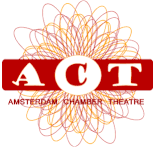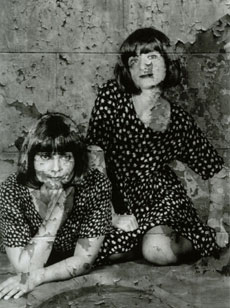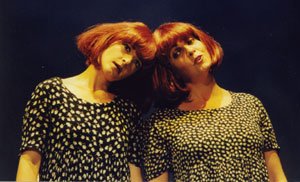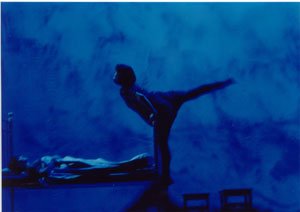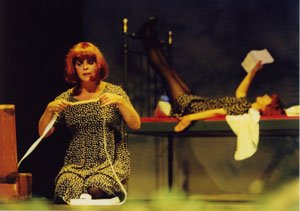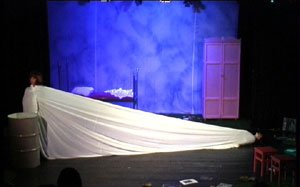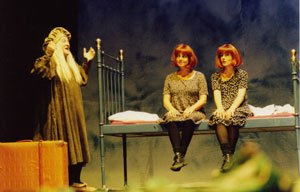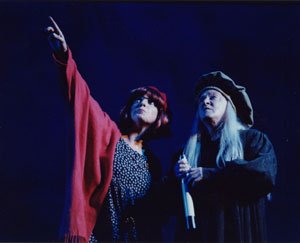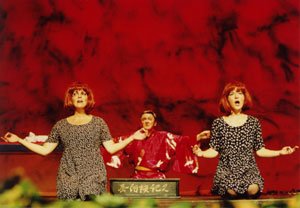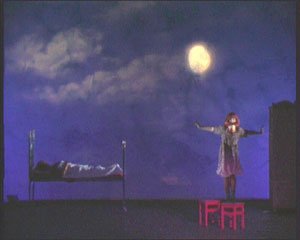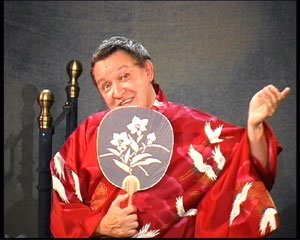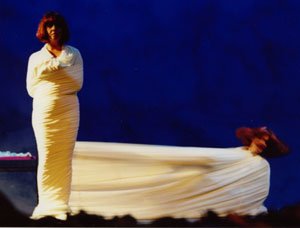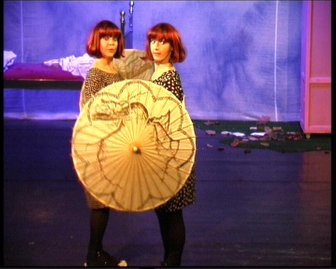Amsterdam Chamber Theatre
MY SISTER EVE
Première 2000 in Lvov, Oekraïne
Based on the work of
Gertrude Stein en Sasha Sokolov
It is a poetical reflection on the loss of the child in ourselves; on the price we must pay for growing up. On the games, dreams and fantasies that we leave behind in our haste to join the adult world.
My sister Eve is an emotional dialogue with yourself about passing time, love and the pain of knowledge. Very much like lyric poetry – the performance exists beyond a plot, an intrigue, or a gradual development of events. It invites the audience to yield to the language of movement, gestures, nuances, rhythm, music, emotions and fragments of text.
SYNOPSIS
I saw a girl with a dog on a leash, an ordinary simple dog. Since then many years have passed, she grew up and leads a grown up life. Now she reads serious books, hurries to her work, comes to late, goes out and gets drunk on wine, envies her neighbors and the birds, lies to her friends, puts lipstick on, betrays her husband, borrows money… - she lives like everybody else…
Was it me on that sunny day? Was it me, who lived in a small room with my parents and who could listen to old records on a gramophone that didn’t work? Was it me, who could hear how on the lawns the untrimmed grass was growing, who could describe the tongue of a humming bird, change a cricket into a butterfly, turn rain into hail and day into night? Was it me in the cemetery, early in the evening, playing the loneliest tune on my accordion?
When did it happen? When did I grow up? Was it the day, that I said “Good bye, Mama!” or when I danced a frantic chardash, inflamed by passion and love, or when I was standing on that viaduct and looked down on a passing freight train, wishing to fall with my arms spread, like a bird?
Who can answer all these questions? Once there was my mysterious friend and adviser, Leonardo, who seemed to know everything, even how to plant the white roses of the wind in the garden. But he disappeared, together with my childhood, like a rattling orange train across a bridge.
Where is she now, that girl with the simple dog?MY SISTER EVE
Première 2000 in Lvov, Oekraïne
Based on the work of
Gertrude Stein en Sasha Sokolov
It is a poetical reflection on the loss of the child in ourselves; on the price we must pay for growing up. On the games, dreams and fantasies that we leave behind in our haste to join the adult world.
My sister Eve is an emotional dialogue with yourself about passing time, love and the pain of knowledge. Very much like lyric poetry – the performance exists beyond a plot, an intrigue, or a gradual development of events. It invites the audience to yield to the language of movement, gestures, nuances, rhythm, music, emotions and fragments of text.
SYNOPSIS
I saw a girl with a dog on a leash, an ordinary simple dog. Since then many years have passed, she grew up and leads a grown up life. Now she reads serious books, hurries to her work, comes to late, goes out and gets drunk on wine, envies her neighbors and the birds, lies to her friends, puts lipstick on, betrays her husband, borrows money… - she lives like everybody else…
Was it me on that sunny day? Was it me, who lived in a small room with my parents and who could listen to old records on a gramophone that didn’t work? Was it me, who could hear how on the lawns the untrimmed grass was growing, who could describe the tongue of a humming bird, change a cricket into a butterfly, turn rain into hail and day into night? Was it me in the cemetery, early in the evening, playing the loneliest tune on my accordion?
When did it happen? When did I grow up? Was it the day, that I said “Good bye, Mama!” or when I danced a frantic chardash, inflamed by passion and love, or when I was standing on that viaduct and looked down on a passing freight train, wishing to fall with my arms spread, like a bird?
Who can answer all these questions? Once there was my mysterious friend and adviser, Leonardo, who seemed to know everything, even how to plant the white roses of the wind in the garden. But he disappeared, together with my childhood, like a rattling orange train across a bridge.
Where is she now, that girl with the simple dog?
CAST
Eva: Frouke Flieringa
evA: Tatiana Kouzovkina
Leonardo Windsender: Istvan Hezso
Director Vladimir Koifman
Set/design:Vladimir Koifman
Script: Vladimir Koifman, Frouke Flieringa, Tatiana Kouzovkina
Music: Tania Lina
Costumes: Studio V&T
Technique; Andrei Fourmanov/Pep mac Ruairi
PRESS
With theatre it is the same as Prevert says is one of his poems: you cannot do anything but prepare an empty cage and patiently wait and hope that a bird will fly in and start to sing. I do not know about you, but Monday evening, watching the performance ‘My sister Eve’, I felt the waving of wings. The bird appeared and it’s flight was very beautiful. The song I quoted here kept coming into my mind as I was getting into the depth of the story of two identical women, standing at opposite sides of the same door. The girl, slowly peeping into the world of adults and the woman, staring into the room of her long forgotten childhood…
Yan Sotkovsky (performance seen at Tempus Art Festival Roznava, Slovakia)
The river has two shores
A blue sky with a smattering of clouds; bright and sunny autumn leaves and a spot of water lost in between. In the twilight – a big iron bed, a tall old cupboard, an iron barrel, an empty picture frame and a drawing of Leonardo on an easel.
It’s a mirage of childhood, of summer and the memories that haunt you – all is gone forever and yet all is present somewhere close by.
In the spotlight – a woman – a girl (Frouke Flieringa) in a short cotton dress, red haired. And beside her – herself – but the one she was many years ago (Tatiana Kouzovkina)
The performance of Amsterdam Chamber Theatre “My Sister Eve” is full of poetry, reflections and of simultaneous existence here(now) and there (then). The world of childhood fantasies when each subject concealed a secret; you hide yourself in an iron barrel and somebody else hides from you in a cupboard. Open the door, don’t be afraid!
Enters a living tale: Leonardo Windsender (Istvan Hezso), wearing a Renaissance robe and a large beret with long grey hair sticking out. A character from our childhood dreams. He is an adult and he knows all about this life and even more. He steps out of a cupboard as a good spirit and only children can see him. He says “I died”, but he is still fishing in the river. And we understand that the name of the river is Eve, she is life that carries you away from your youth, your childhood dreams.
It is not a coincidence that Leonardo appears once in a Japanese kimono, it is part of the “sad enchantment”, a strong theme in the show. It is hidden in old photographs, in a bundle of old letters addressed to people with funny names, in the heartbreaking melodies of forgotten songs that Eve plays on the accordion. Simple things – those that surround us from our early days – possess a special beauty and attraction. When you are small you know that, but later you store it in your memory. You only have to open this secret suitcase and it will all come back – the smells, the sounds; sensations of forgotten happiness.
Crossroads of time and two worlds; the picture of a young girl that turns into a self portrait of an artist – that is the poetry of the performance.
In each of us lives a child. This counts especially for actors, who’s life is interwoven with playing games. The actors of Amsterdam Chamber Theatre managed to tell us about the unique world of childhood perception and about the anguish of adults over their lost youth.
“We drank from this clean water and we will never grow old”
Maria Dolmatova, Elena Sidjakina, “Otsebjatina” St. Petersburg, 8 June 2002
I look into myself like in a mirror…
I suppose everyone knows that there is poetry and prose. But not everyone would link poetry and theatre, expecting from this art form a story, a development that in theatre science is described as ‘entanglement, culmination and denouement’.
For an audience with traditional expectations it will not be an easy task to comprehend the new performance of the Amsterdam Chamber Theatre ‘My Sister Eve’, directed by Vladimir Koifman.
The creators of this performance are counting on a poetical perception, on the ability of the audience to open themselves to an involuntary stream of stage action that is in principle open to free interpretation. That is, if you can call what poets describe as “the souls involuntary impulses” or “the soul that sings and mourns” a stage action.
So the audience is offered to look into the part of us that is beyond surgical interference, to witness two reflecting and polarizing beings (Eve and evE) rubbing against each other.
To join the spiritual analyses of oneself in free connection with an illusionary outside world.
A third character is summoned to help such an analysis. Undoubtedly important is the definition of this Leonardo as ‘Windsender’, whose calm appearance gives form to the fantasies and the vague presentiments of the heroine(s). But he also promises her a storm and when it comes it sweeps half of her away.
What is happening on stage is equal to an intimate lyrical confession, which can be listened to, or just looked at. It is a confession with which you can confront yourself, even melt into, but can never be united. Because even two sides of the same soul (in a fine stage choreography that is well brought out by the actresses Frouke Flieringa and Tatiana Kouzovkina) although interlaced can not find peace. One part fades away, together with childhood dreams about passion and love, kindness and beauty. The good thing (according to the creators of the performance) is that all this doesn’t die, but merely sleeps “a girl that sleeps on the sand around the 15th of July of an irrevocable year”.
Two actresses with identical red hair and almost identical simple dresses seem, like Siamese twins, to be craving to be freed from one another. Looking at each other like in a mirror they are unable to part, neither by the lively excitement of competition, nor in their final comprehension of death, when Leonardo’s beautiful portrait of a young woman turns into an image of ugly old age.
I would like to add that the concept of the theatre space underlines the integrity of the whole idea. The darkness that surrounds the stage forces us to look inside the “solitary cell of our soul”, It is like an organism – everything fits and nothing is unnecessary. A visual unity where a pink cupboard, red stools, a blue bed and green grass offer us a place where out adult memory can fly freely.
Olga Surkova, Doctor of Fine Arts, a/o. European correspondent for the Moscow film magazine “Art of the Cinema” (Performance seen at the Stadsschouwburg Amsterdam, November 2000)
